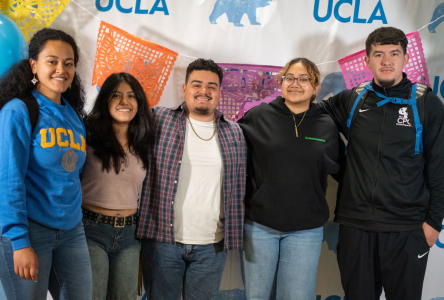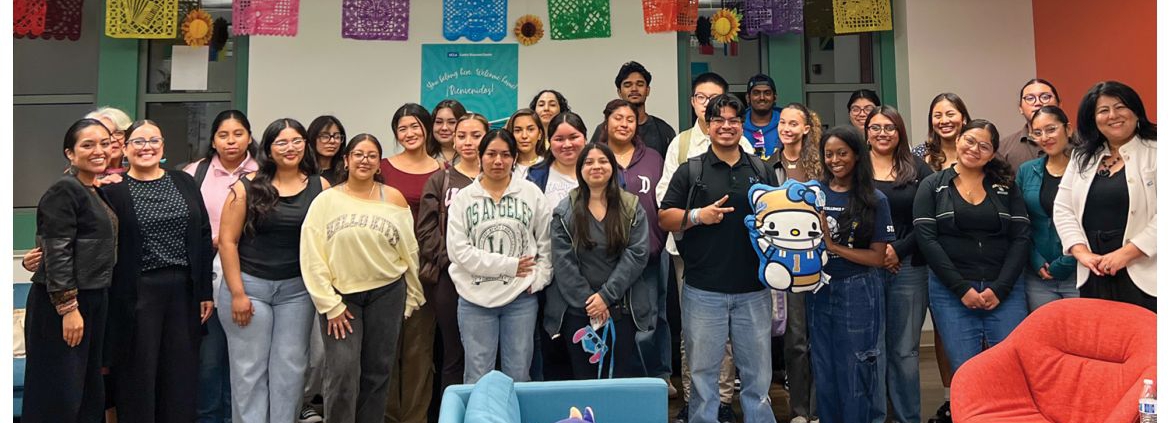Building belonging: UCLA’s Excelencia Scholars and the future of Hispanic-Serving Institutions
Like flowers blooming in the evening sky, hues of carmine, ochre and emerald animated the cirrus clouds above the UCLA Latinx Success Center as students arrived to the fall reception for the Excelencia Scholars Program, a UCLA Hispanic-Serving Institution initiative that provides financial, academic and personal support to low-income, academically talented students.
Even more striking than the Oct. 21 sunset was each scholar’s journey to campus that day — and to college, period.
A self-described bookworm who loves to draw, Odalis Lopez Guerra moved with her family from El Salvador to South Los Angeles when she was 4. Although UCLA seemed financially and academically out of reach, Lopez Guerra worked hard thanks to encouragement from her high school guidance counselors. And despite the obstacles she faced, including the impact of witnessing a shooting at one of her school’s football games, she made it to UCLA, where she is now a second-year education and social transformation major.
“Knowing where I come from and the trajectory that brought me to where I am now, I’m constantly reminded of why education is so powerful,” she said.
While other Excelencia Scholars like Lopez Guerra have experienced — and overcome — tremendous daily challenges in and out of the classroom, they find themselves on the front line of a larger struggle, one that was top of mind for many at the event. In September, the U.S. Department of Education announced it would withhold $350 million in what they called “unconstitutional” grants earmarked for Minority-Serving Institutions, including HSIs.
For UCLA, which is on track to become a federally designated HSI by year’s end, this decision holds devastating consequences.
“Pulling support from institutions with limited resources, especially those already serving large numbers of underrepresented students, would be devastating,” said Elizabeth Gonzalez, who was named director of UCLA’s Hispanic-Serving Institution initiative in 2022 and served as the architect of similar initiatives at community colleges in San Diego and San Jose, and at UC Santa Cruz, where she earned a master’s and doctorate in psychology. “The impact wouldn’t just be felt by emerging HSIs like UCLA or UC campuses that already hold the designation, but across the CSU system, California’s community colleges and higher education more broadly.”
To qualify as an HSI, UCLA must meet two benchmarks: At least 25% of its undergraduate population must identify as Latino, and 37% must be Pell Grant recipients. Before the government ceased its funding, achieving this goal would have unlocked federal grants that not only strengthened educational programs for Latino and other underserved communities, but also benefited the entire campus.
“As of fall of 2024, 24.2% of undergraduates at UCLA were Latino and 36.5% were Pell-eligible,” said Gonzalez, who is a UCLA alumna. “These numbers reflect a growing truth: UCLA is becoming more representative of the communities it serves — an evolution that continues to distinguish it as a university of and for Angelenos.”
Despite the shifting federal landscape, UCLA has continued its commitment to scaling its student support infrastructure, guided by recommendations from UCLA’s Hispanic-Serving Institution Task Force report, “Cultivating the Seeds of Change,” and embodied by the spirit on display at the Excelencia Scholars Program welcome.
“Even in moments of uncertainty, our commitment to students remains unwavering,” said Arlene Cano Matute, the inaugural director of UCLA’s Latinx Success Center. “The Excelencia Scholars program and the Latinx Success Center mark a meaningful step toward building a culture of “servingness” at UCLA. They’re more than initiatives; they’re a promise that students will be supported, empowered and reminded every day that they belong at one of the nation’s top universities.”
Reducing barriers to college access and affordability
The Excelencia Scholars Program was established thanks to a $1.5 million gift that was part of a larger donation to found the Latinx Success Center earlier this year.
Scholars were selected from 10 Los Angeles high schools where UCLA School of Education and Information Studies faculty are deeply engaged, as well as transfer students from across the Golden State who participated in the Center for Community College Partnerships (CCCP) Scholars program.

Students gathered during UCLA’s Latinx Success Center opening on Cesar Chavez Day in March.
These renewable scholarships — $10,000 over four years for freshmen and $5,000 over two years for transfer students — are already creating a thriving community, with the first cohort of 99 scholars enrolling last fall and the second cohort of 101 joining this fall. By reducing financial barriers, the program directly supports college access and affordability; only 17% of Excelencia Scholars took out loans, borrowing an average of $3,728, which is far below the average for low-income California students at UCLA.
In addition, students are connected to resources through a cross-campus collaboration that includes the Office of Financial Aid and Scholarships, the Academic Advancement Program, CCCP and the UCLA Latino Alumni Association.
Adriana Galván, dean and vice provost of undergraduate education, the UCLA College division where many of these units are housed, sees the program as a cornerstone of the university’s commitment to student success.
“As a neuroscientist who has spent over 20 years researching adolescent brain development, I know that young people need wraparound support as they transition into adulthood and navigate the changing social landscape that defines college,” Galván said.
Campus leaders agree that this kind of support is equally important regardless of each student’s journey to higher education, whether they arrive at UCLA as first-year students, by transferring or other pathways.
“At the Center for Community College Partnerships, we’ve spent years mentoring and preparing students to transfer to UCLA, so seeing the university continue to invest in them through programs like Excelencia is deeply meaningful,” said Claudia Salcedo, assistant vice provost for academic partnerships and director of CCCP. “UCLA is sending a powerful message: We stand by our transfer students and believe in their success.”
The changing face of the future
William Nunez De La O, a first-year transfer majoring in cognitive science, juggled a full-time job at Disneyland while attending Cyprus College. Raised in Paramount, financial pressures eventually pushed his working-class family to relocate to Fresno during his sophomore year of high school. But Nunez De La O never lost sight of his dream of becoming a Bruin. Now that he’s here, he’s eager to explore the intersection of business and artificial intelligence, but doesn’t forget to savor small joys, like winning a UCLA-themed Hello Kitty plush pillow at the reception.
Oscar Hernandez, a psychology major on the pre-health track, wants to become a physician assistant. He draws inspiration from his Guatemalan parents and enjoys discussing what he’s studying in his Central American studies course with them. He makes time to work as a CCCP peer advisor, offering advice to community college students who want to make the same transition he was able to.
The stories of these Excelencia Scholars reflect a new reality. According to a new data analysis by the Latino GDP Project from UCLA and Cal Lutheran, for the first time in history, one out of every five people in the U.S. is Latino.
“This fact echoes a finding from the annual U.S. Latino GDP report: Education attainment among Latinos doesn’t just benefit individuals — it raises the standard of living for all Americans,” Gonzalez said. “Since 2019, Latinos are driving over 30% of the country’s GDP growth, and their gains in education, health and workforce participation are powering the nation’s future.
“At UCLA, where our students are brimming with potential, I truly believe we are nurturing the artists, leaders, healers and changemakers of tomorrow,” she said.
This call for optimism reflects a vision that so many of the Excelencia Scholars themselves are determined to realize.
“There’s still so much hope left in the world; you just have to look a little harder to find it,” Nunez De La O said. “I love the fact that it’s contagious. If you have hope, you pass it on to others.”
Note, this article originally appeared in the UCLA Newsroom.


 Elizabeth Gonzalez / composite by Trever Ducote/UCLA
Elizabeth Gonzalez / composite by Trever Ducote/UCLA
 composite by Trever Ducote/UCLA
composite by Trever Ducote/UCLA